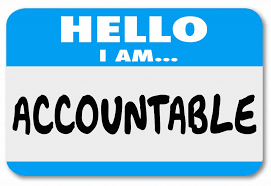Too often I hear from business clients or coaching clients that their employees aren’t accountable, don’t take responsibility for their work, aren’t interested in doing more than is asked of them, wait for explicit instructions before doing anything, or some similar sentiment. This client criticism typically results in me asking why the situation is the way it is, what the company or manager has done to address the issue, and what an improved situation would look like. Oh, and as part of all that, we have the “What the heck is personal accountability, anyway?” conversation.
“If you could kick the person in the pants responsible for most of your trouble, you wouldn’t sit for a month.” ―Theodore Roosevelt
What Is Personal Accountability?
Personal accountability is the internal obligation a person feels to complete a project or fulfill a task to which he or she has committed. It’s an attitude and a personal choice that manifest in actions to “own” (take full responsibility for) issues and their outcomes (good and bad). It’s a rejection of “It’s not my job” and an embrace of “I’m responsible for this.”
When people adopt a sense of accountability, they recognize that their participation can and will make a big difference. They go the extra mile because they know what to do and how their actions will drive results. Employees become more engaged when they can describe their role in terms of outcomes and desired results. This adds energy and excitement, since most people crave meaning and fulfillment in their work.
Personal accountability and engagement are the driving forces behind achieving great results. However, as a manager, it’s your job to help employees see how their participation contributes to the organization’s success. In a culture of accountability, people step forward to become part of the solution – often when they see others doing it. Managers should seize every opportunity to model this behavior with their own attitudes and actions, creating a trickle-down effect.
Successful companies are full of employees and managers who constantly push themselves to meet—and exceed—their goals. This self-motivation is marked by a culture of personal accountability that permeates the entire organization. If personal accountability is strong in your company culture, you’ll find that your workers assume responsibility for finding solutions by working through problems. And, rather than assigning blame elsewhere, they stand by their word and honor their commitments.
Companies face the challenge of maintaining employee engagement and fostering high levels of personal accountability. To achieve these aims, managers must understand the following:
- Employees want to feel that they are part of the bigger picture.
- If they feel connected to the company’s mission and its future, employees will be more motivated and make better decisions because they believe that their actions matter.
- Employees are more engaged to reach their goals if they help establish those goals and aren’t merely provided a list of tasks to do.
- Managers can engage employees by effectively delegating responsibilities, then coaching them to succeed.
On the flip side, inherent in companies that lack personal accountability is the employees’ belief that “Someone else is preventing me from being successful.” “They” aren’t doing “their” job. “They” need to improve; not me.” The focus in these statements and the mindset behind them are about fixing the behavior of others. That mindset is negative and dangerous—and when it dominates a company’s culture, it can spell doom for that organization. Fortunately, personal accountability problems can be fixed!
As a Manager, What to Do—and What Not to Do
The causal relationship is clear: empowering employees makes them more engaged, engaged employees exhibit more personal accountability, and widespread personal accountability can greatly increase a company’s ability to succeed. So how do you get from point A to point B?
Once you’ve established clear expectations, examine your management style for anything that might stifle (or even derail!) the development of personal accountability among your employees. Be sure to:
- Delegate effectively;
- Avoid micromanaging your employees (instead, empower them by articulating a goal then cutting them loose to figure out how to accomplish it);
- Provide feedback on past and current performance and provide coaching on future action;
- Recognize and reward behavior that exhibits personal accountability;
- Encourage employees to push themselves to, for example, think outside the box and extend themselves beyond their comfort zones;
- Encourage employees to achieve outstanding results; and
- Respond positively and enthusiastically when employees do achieve their goals, and don’t slam them when they fall short. Instead, coach them on how to apply the lessons they learned to the next project.
Managers, as you guide your organization, don’t take shortcuts. If you find yourself giving orders and demanding action, saying “I know how to do this—and you don’t,” or solving problems yourself instead of coaching employees on how to solve them, it’s time to step back, relax your grip on the reins, and empower your staff to make their own choices about how to get their jobs done. Otherwise, your micromanaging behavior and poor management skills will defeat your efforts to instill personal accountability in your staff.
The payoffs for positive accountability are better performance metrics but perhaps more significant is the impact on how employees feel inside. When people participate more fully in their jobs, they create meaning and fulfillment, for themselves and others. Work becomes more pleasurable. And when people start achieving better results, the personal accountability has a compounding affect.
Additional Sources: David Herdlinger “Corporate Culture Drives Results,” Val Grubb “Inspiring a Culture of Personal Accountability”

